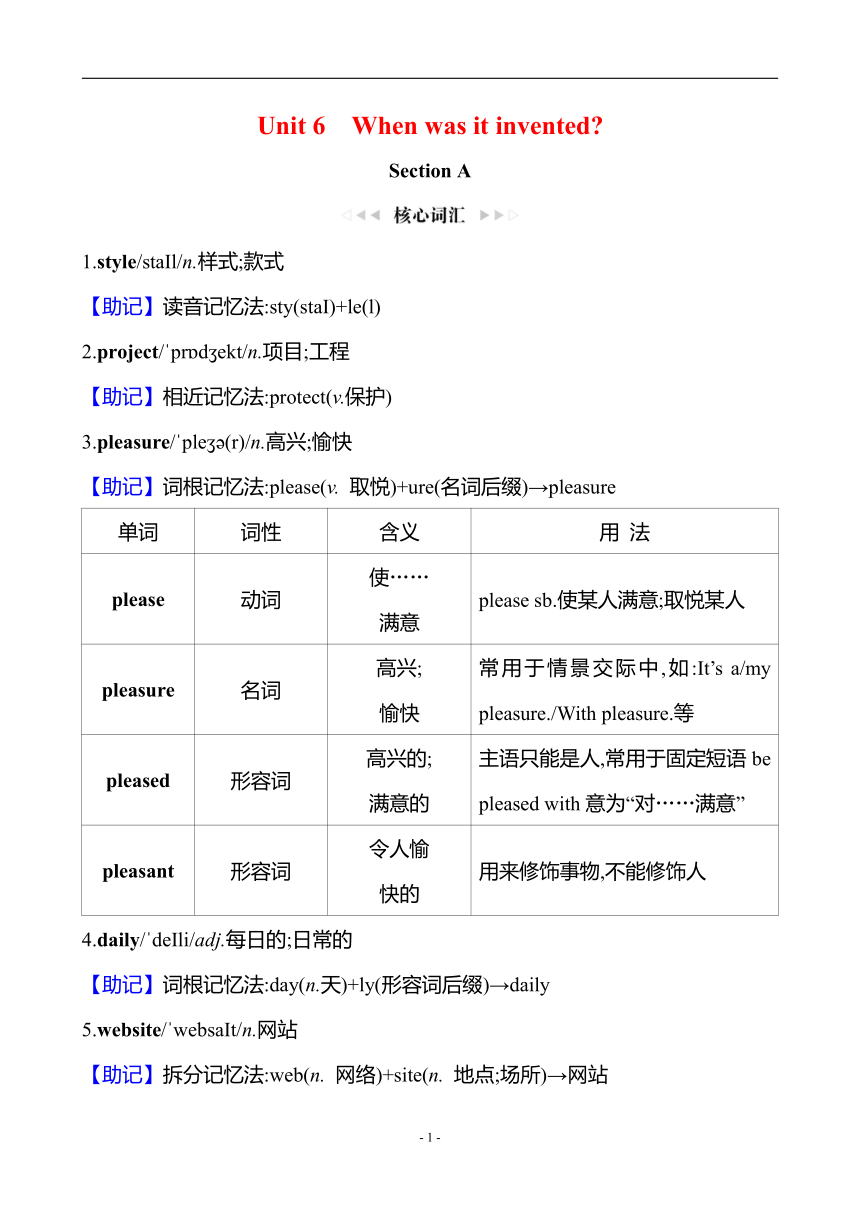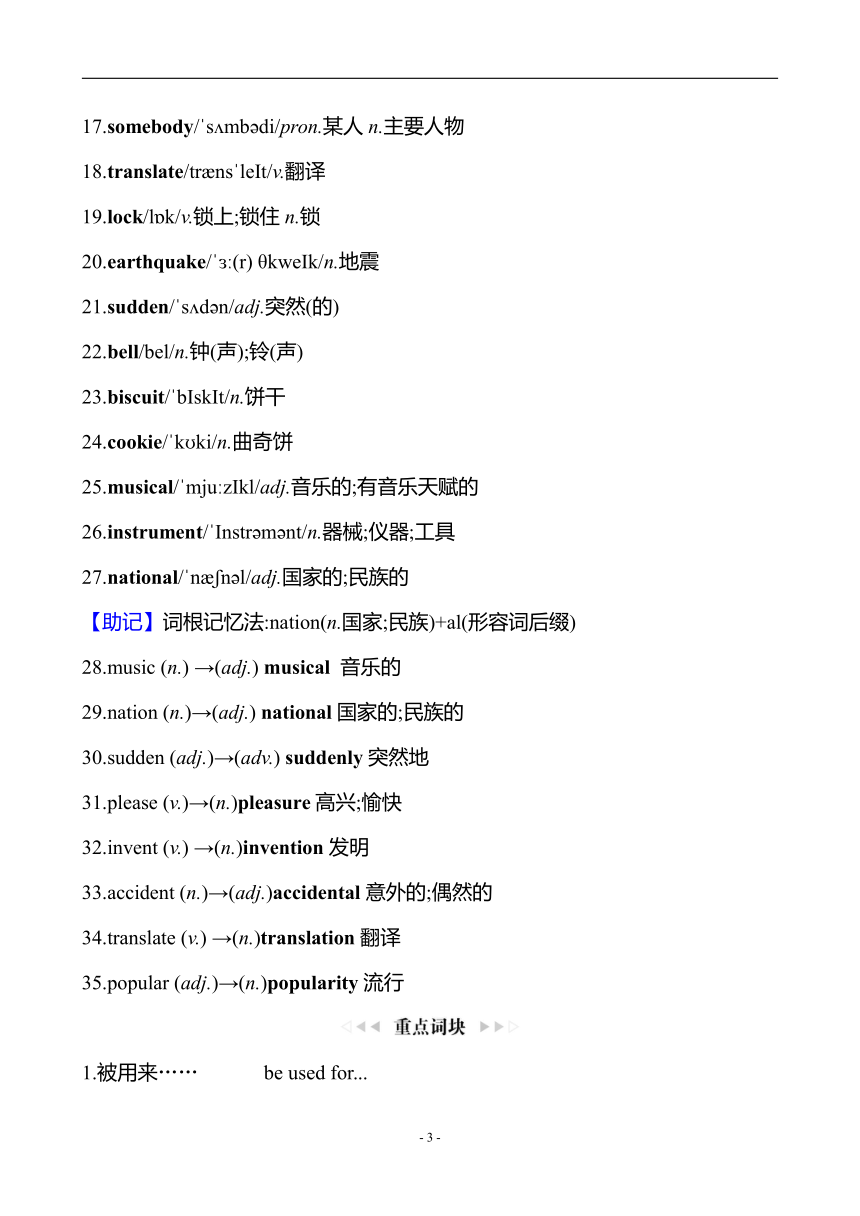人教版九年级全一册Unit 6 When was it invented? 知识清单
文档属性
| 名称 | 人教版九年级全一册Unit 6 When was it invented? 知识清单 |

|
|
| 格式 | docx | ||
| 文件大小 | 84.6KB | ||
| 资源类型 | 教案 | ||
| 版本资源 | 人教新目标(Go for it)版 | ||
| 科目 | 英语 | ||
| 更新时间 | 2024-06-09 21:05:51 | ||
图片预览



文档简介
Unit 6 When was it invented
Section A
1.style/staIl/n.样式;款式
【助记】读音记忆法:sty(staI)+le(l)
2.project/ pr d ekt/n.项目;工程
【助记】相近记忆法:protect(v.保护)
3.pleasure/ ple (r)/n.高兴;愉快
【助记】词根记忆法:please(v. 取悦)+ure(名词后缀)→pleasure
单词 词性 含义 用 法
please 动词 使…… 满意 please sb.使某人满意;取悦某人
pleasure 名词 高兴; 愉快 常用于情景交际中,如:It’s a/my pleasure./With pleasure.等
pleased 形容词 高兴的; 满意的 主语只能是人,常用于固定短语be pleased with意为“对……满意”
pleasant 形容词 令人愉 快的 用来修饰事物,不能修饰人
4.daily/ deIli/adj.每日的;日常的
【助记】词根记忆法:day(n.天)+ly(形容词后缀)→daily
5.website/ websaIt/n.网站
【助记】拆分记忆法:web(n. 网络)+site(n. 地点;场所)→网站
6.pioneer/ paI nI / n.先锋;先驱
【助记】读音记忆法:pio(paI )+neer(nI ) →pioneer
7.list/lIst/v.列表;列清单n.名单;清单
8.mention/ men n/v.提到;说到
【助记】读音记忆法:men(men)+tion( n) →mention
9.ruler/ ru l /n.统治者;支配者
【助记】词根记忆法:rule(n. 规则)+r(名词后缀)→制定规则的人→统治者;支配者
10.boil/b Il/v.煮沸;烧开
【助记】拆分记忆法:b(把)+oil(油)→把油(oil)煮沸(boil)
11.remain/rI meIn/v.保持不变;剩余
【助记】词根记忆法:re(前缀:向后,重复)+main(adj.主要的)
12.smell/smel/n.气味v.发出……气味;闻到
名词 不可数名词,意为“气味”,但表示“某一种味道”时,用作可数名词
动词 连系动词,意为“闻起来”,常接形容词作表语
及物动词,意为“闻到”,后接名词或代词
13.trade/treId/n.贸易;交易v.做买卖;从事贸易
【助记】相近记忆法:trader(n. 商人)
14.doubt/da t/n.疑惑;疑问v.怀疑
15.fridge/frId /n.冰箱
【助记】相近记忆法:bridge(n. 桥)
16.low/l /adj.低的;矮的
【助记】搭配记忆法:low voice 低声
17.somebody/ s mb di/pron.某人n.主要人物
18.translate/tr ns leIt/v.翻译
19.lock/l k/v.锁上;锁住n.锁
20.earthquake/ (r) θkweIk/n.地震
21.sudden/ s d n/adj.突然(的)
22.bell/bel/n.钟(声);铃(声)
23.biscuit/ bIskIt/n.饼干
24.cookie/ k ki/n.曲奇饼
25.musical/ mju zIkl/adj.音乐的;有音乐天赋的
26.instrument/ Instr m nt/n.器械;仪器;工具
27.national/ n n l/adj.国家的;民族的
【助记】词根记忆法:nation(n.国家;民族)+al(形容词后缀)
28.music (n.) →(adj.) musical 音乐的
29.nation (n.)→(adj.) national国家的;民族的
30.sudden (adj.)→(adv.) suddenly突然地
31.please (v.)→(n.)pleasure高兴;愉快
32.invent (v.) →(n.)invention发明
33.accident (n.)→(adj.)accidental意外的;偶然的
34.translate (v.) →(n.)translation翻译
35.popular (adj.)→(n.)popularity流行
1.被用来…… be used for...
2.有道理 have a point
3.偶然;意外地 by accident
4.掉入 fall into
5.沏茶 make tea
6.突然;猛地 all of a sudden
7.毫无疑问;的确 without doubt
8.把……翻译成…… translate...into...
9.发生 take place
take place 表示“发生”,一般指必然会发生的事情;take place还可表示“举行某种活动”
happen 指“偶然发生”时,主语为“事”;当主语是“人”时,意为“碰巧”。 常用搭配:happen to do sth.碰巧做某事
1.我认为电视是在汽车之前发明的。
I think the TV was invented before the car.
2.它们是被用来在黑暗中看东西的。
They are used for seeing in the dark.
3.据说有一位叫作神农的中国统治者最早发现了茶可以饮用。
It is said that a Chinese ruler called Shen Nong was the first to discover tea as a drink.
4.人们认为茶在六至七世纪传到了朝鲜和日本。
It is believed that tea was brought to Korea and Japan during the 6th and 7th centuries.
5.在英国,茶到大约1660年才出现。
In England, tea didn’t appear until around 1660.
Section B
1.sour/ sa (r)/adj.酸的;有酸味的
2.customer/ k st m (r)/n.顾客;客户
【助记】拆分记忆法:custom(习俗)+er
3.Canadian/k neIdi n/adj.加拿大的;加拿大人的n.加拿大人
【助记】相近记忆法:Canada(加拿大)
4.divide/dI vaId/v.分开;分散
5.basket/ bɑ skIt/n.篮;筐
【助记】相近记忆法:basketball(篮球)
6.hero/ hI r /n.英雄;男主角
7.nearly/ nI li/ adv.几乎
【助记】词根记忆法:near(adj. 近的)+ly(副词后缀)→接近;几乎;差不多
8.profession (n.)→(adj.) professional 职业的;专业的
9.salt (n.)→(adj.) salty咸的
1.错误地;无意中 by mistake
2.把……分开 divide...into
3.不但……而且…… not only...but also...
4.……的数量 the number of...
5.导致 lead to
6.梦想 dream of
7.决定 decide on
8.提出(意见、想法等) come up with
9.钦佩;仰慕 look up to
1.薯片是无意中被发明的。
Potato chips were invented by mistake.
2.乔治想使顾客高兴。
George wanted to make the customer happy.
3.篮球是被一个叫作詹姆斯·奈史密斯的加拿大博士发明的。
Basketball was invented by a Canadian doctor named James Naismith.
4.当他是个大学老师的时候,他被要求想出一个能在冬天玩的游戏。
When he was a college teacher, he was asked to think of a game that could be played in the winter.
5.同一队的队员们必须齐心协力把球投进另外一队的篮筐里。
Players on the same team must work together to get the ball in the other team’s basket.
6.如今,随着许多年轻人都梦想成为著名的篮球运动员,篮球在世界各地也越来越普及了。
Today, the popularity of basketball has risen around the world, with many young people dreaming of becoming famous players.
7.在NBA的外国球员,包括中国球员,数量增多了。
The number of foreign players, including Chinese players, in the NBA has increased.
- 6 -
Section A
1.style/staIl/n.样式;款式
【助记】读音记忆法:sty(staI)+le(l)
2.project/ pr d ekt/n.项目;工程
【助记】相近记忆法:protect(v.保护)
3.pleasure/ ple (r)/n.高兴;愉快
【助记】词根记忆法:please(v. 取悦)+ure(名词后缀)→pleasure
单词 词性 含义 用 法
please 动词 使…… 满意 please sb.使某人满意;取悦某人
pleasure 名词 高兴; 愉快 常用于情景交际中,如:It’s a/my pleasure./With pleasure.等
pleased 形容词 高兴的; 满意的 主语只能是人,常用于固定短语be pleased with意为“对……满意”
pleasant 形容词 令人愉 快的 用来修饰事物,不能修饰人
4.daily/ deIli/adj.每日的;日常的
【助记】词根记忆法:day(n.天)+ly(形容词后缀)→daily
5.website/ websaIt/n.网站
【助记】拆分记忆法:web(n. 网络)+site(n. 地点;场所)→网站
6.pioneer/ paI nI / n.先锋;先驱
【助记】读音记忆法:pio(paI )+neer(nI ) →pioneer
7.list/lIst/v.列表;列清单n.名单;清单
8.mention/ men n/v.提到;说到
【助记】读音记忆法:men(men)+tion( n) →mention
9.ruler/ ru l /n.统治者;支配者
【助记】词根记忆法:rule(n. 规则)+r(名词后缀)→制定规则的人→统治者;支配者
10.boil/b Il/v.煮沸;烧开
【助记】拆分记忆法:b(把)+oil(油)→把油(oil)煮沸(boil)
11.remain/rI meIn/v.保持不变;剩余
【助记】词根记忆法:re(前缀:向后,重复)+main(adj.主要的)
12.smell/smel/n.气味v.发出……气味;闻到
名词 不可数名词,意为“气味”,但表示“某一种味道”时,用作可数名词
动词 连系动词,意为“闻起来”,常接形容词作表语
及物动词,意为“闻到”,后接名词或代词
13.trade/treId/n.贸易;交易v.做买卖;从事贸易
【助记】相近记忆法:trader(n. 商人)
14.doubt/da t/n.疑惑;疑问v.怀疑
15.fridge/frId /n.冰箱
【助记】相近记忆法:bridge(n. 桥)
16.low/l /adj.低的;矮的
【助记】搭配记忆法:low voice 低声
17.somebody/ s mb di/pron.某人n.主要人物
18.translate/tr ns leIt/v.翻译
19.lock/l k/v.锁上;锁住n.锁
20.earthquake/ (r) θkweIk/n.地震
21.sudden/ s d n/adj.突然(的)
22.bell/bel/n.钟(声);铃(声)
23.biscuit/ bIskIt/n.饼干
24.cookie/ k ki/n.曲奇饼
25.musical/ mju zIkl/adj.音乐的;有音乐天赋的
26.instrument/ Instr m nt/n.器械;仪器;工具
27.national/ n n l/adj.国家的;民族的
【助记】词根记忆法:nation(n.国家;民族)+al(形容词后缀)
28.music (n.) →(adj.) musical 音乐的
29.nation (n.)→(adj.) national国家的;民族的
30.sudden (adj.)→(adv.) suddenly突然地
31.please (v.)→(n.)pleasure高兴;愉快
32.invent (v.) →(n.)invention发明
33.accident (n.)→(adj.)accidental意外的;偶然的
34.translate (v.) →(n.)translation翻译
35.popular (adj.)→(n.)popularity流行
1.被用来…… be used for...
2.有道理 have a point
3.偶然;意外地 by accident
4.掉入 fall into
5.沏茶 make tea
6.突然;猛地 all of a sudden
7.毫无疑问;的确 without doubt
8.把……翻译成…… translate...into...
9.发生 take place
take place 表示“发生”,一般指必然会发生的事情;take place还可表示“举行某种活动”
happen 指“偶然发生”时,主语为“事”;当主语是“人”时,意为“碰巧”。 常用搭配:happen to do sth.碰巧做某事
1.我认为电视是在汽车之前发明的。
I think the TV was invented before the car.
2.它们是被用来在黑暗中看东西的。
They are used for seeing in the dark.
3.据说有一位叫作神农的中国统治者最早发现了茶可以饮用。
It is said that a Chinese ruler called Shen Nong was the first to discover tea as a drink.
4.人们认为茶在六至七世纪传到了朝鲜和日本。
It is believed that tea was brought to Korea and Japan during the 6th and 7th centuries.
5.在英国,茶到大约1660年才出现。
In England, tea didn’t appear until around 1660.
Section B
1.sour/ sa (r)/adj.酸的;有酸味的
2.customer/ k st m (r)/n.顾客;客户
【助记】拆分记忆法:custom(习俗)+er
3.Canadian/k neIdi n/adj.加拿大的;加拿大人的n.加拿大人
【助记】相近记忆法:Canada(加拿大)
4.divide/dI vaId/v.分开;分散
5.basket/ bɑ skIt/n.篮;筐
【助记】相近记忆法:basketball(篮球)
6.hero/ hI r /n.英雄;男主角
7.nearly/ nI li/ adv.几乎
【助记】词根记忆法:near(adj. 近的)+ly(副词后缀)→接近;几乎;差不多
8.profession (n.)→(adj.) professional 职业的;专业的
9.salt (n.)→(adj.) salty咸的
1.错误地;无意中 by mistake
2.把……分开 divide...into
3.不但……而且…… not only...but also...
4.……的数量 the number of...
5.导致 lead to
6.梦想 dream of
7.决定 decide on
8.提出(意见、想法等) come up with
9.钦佩;仰慕 look up to
1.薯片是无意中被发明的。
Potato chips were invented by mistake.
2.乔治想使顾客高兴。
George wanted to make the customer happy.
3.篮球是被一个叫作詹姆斯·奈史密斯的加拿大博士发明的。
Basketball was invented by a Canadian doctor named James Naismith.
4.当他是个大学老师的时候,他被要求想出一个能在冬天玩的游戏。
When he was a college teacher, he was asked to think of a game that could be played in the winter.
5.同一队的队员们必须齐心协力把球投进另外一队的篮筐里。
Players on the same team must work together to get the ball in the other team’s basket.
6.如今,随着许多年轻人都梦想成为著名的篮球运动员,篮球在世界各地也越来越普及了。
Today, the popularity of basketball has risen around the world, with many young people dreaming of becoming famous players.
7.在NBA的外国球员,包括中国球员,数量增多了。
The number of foreign players, including Chinese players, in the NBA has increased.
- 6 -
同课章节目录
- Unit 1 How can we become good learners.
- Section A
- Section B
- Unit 2 I think that mooncakes are delicious!
- Section A
- Section B
- Unit 3 Could you please tell me where the restroom
- Section A
- Section B
- Unit 4 I used to be afraid of the dark.
- Section A
- Section B
- Unit 5 What are the shirts made of?
- Section A
- Section B
- Review of Units 1-5
- Unit 6 When was it invented?
- Section A
- Section B
- Unit 7 Teenagers should be allowed to choose their
- Section A
- Section B
- Unit 8 It must belong to Carla.
- Section A
- Section B
- Unit 9 I like music that I can dance to.
- Section A
- Section B
- Unit 10 You're supposed to shake hands.
- Section A
- Section B
- Review of Units 6-10
- Unit 11 Sad movies make me cry.
- Section A
- Section B
- Unit 12 Life is full of the unexpected
- Section A
- Section B
- Unit 13 We're trying to save the earth!
- Section A
- Section B
- Unit 14 I remember meeting all of you in Grade 7.
- Section A
- Section B
- Review of Units 11-14
